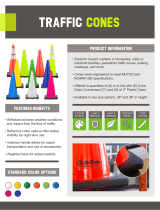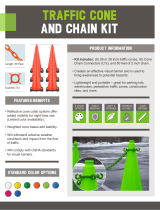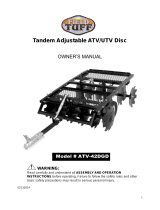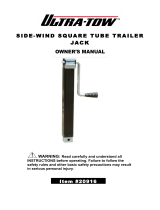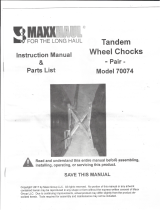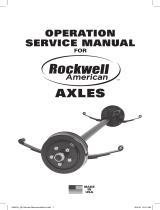Page is loading ...

OPERATORS AND PARTS MANUAL NO. 05-01-TRAILER
PB-TRAILER
MANUFACTURED BY
County Hwy. A West
P.O. Box 405
Dorchester, Wisconsin 54425-0405
Phone 715-654-5132 • FAX 715-654-5513
1-800-325-9103
www.meyermfg.com
E-mail: [email protected]
DO NOT OPERATE EQUIPMENT UNTIL THIS MANUAL HAS BEEN READ AND UNDERSTOOD.
12/09
TANDEM TRAILER
XT2200
XT2200L
XT2200XL
MODELS
XT1600
XT1600L
MODELS

Tandem Trailer Page 2

TABLE OF CONTENTS
Table of Contents ....................................3
Introduction .......................................4
Warranty .........................................5
Safety ..........................................6
Safety Precautions....................................7
Transporting .......................................8
Use Safety Chain ..................................8
Attaching Trailer with brakes To Tow Vehicle ....................9
Farm implement tires.................................9
Safety precautions ................................9
Maintenance Instructions................................10
Lubrication -
Figure 2. .......................................10
Inspection ......................................10
Pack Wheel Bearings ................................11
Adjust Wheel Bearing Preload ...........................11
Farm Implement Tires ...............................11
Service & Maintenance Tips ..........................11
Meyer Equipment Wheel Torque ..........................12
Brake Maintenance .................................13
Bleeding Of Brakes ...............................13
Tire inflation.....................................13
Repair parts ......................................14
Models XT1600 & XT1600L Frame & O-Beam ...................14
Model XT2200, XT2200L & XT2200XL Frame ...................16
Model XT2200, XT2200L & XT2200XL Frame ...................17
Model XT2200, XT2200L & XT2000XL O-Beam ..................18
Model XT2200, XT2200L & XT2000XL Axle & Wheels...............19
Hub For Models XT1600 & XT1600L .......................20
Hub For Models XT2200, XT2200L & XT2000XL .................21
XT2200 Optional Brake Package ..........................22
Trailer And Box Mounting Specification Sheet ...................26
Specifications ....................................27
Tandem Trailer Page 3

INTRODUCTION
Congratulations on your purchase of a new Meyer
farm equipment product. Undoubtedly you have given
much consideration to your purchase and we’re proud
that you have selected Meyer. Pride in craftsmanship,
engineering and customer service have made Meyer
products the finest in the farm equipment industry
today.
There is no substitute for quality. That is why
thousands of people like you have purchased Meyer
farm equipment. They felt it was the best equipment to
serve their farming needs, now and in years to come.
We ask that you follow our policy of “safety first,” and
we strongly suggest that you read through the owner’s
manual before operating your Meyer farm equipment.
Meyer Manufacturing Corporation wants to thank you
for not compromising quality. We are determined to
offer excellence in customer service as well as
provide you with the very best value for your dollar.
REMEMBER:
FARM EQUIPMENT BUYERS
TRUST THE NAME MEYER!
Sincerely,
All Employees of
MEYER MANUFACTURING CORPORATION
Meyer Mfg. Corp. reserves the right to make
improvements in design, or changes in specifications
at any time, without incurring any obligation to owners
of units previously sold.
This supersedes all previous published instructions.
IMPORTANT:
Complete Meyer Mfg. Corp. invoice and promptly
forward a copy to Meyer Mfg. Corp. to validate the
manufacturer’s warranty. The product model and
serial number are recorded on this certificate and
below for proper identification of your Meyer Farm
Trailer.
Model No. ______________________________
Serial No. ______________________________
Date of Purchase________________________
At the back of this manual is the repair parts section.
All replacement parts are to be obtained from or
ordered through your Meyer dealership. When
ordering repair parts, refer to the parts section and
give complete information including quantity, correct
part number, detailed description and even Model No.
and Serial No. of the Meyer Farm Trailer which needs
repair parts.
Tandem Trailer Page 4
NOTE: All references to right hand (RH), left hand
(LH), front and rear apply to the product as viewed
from the rear of the trailer.

WARRANTY
Meyer Mfg. Corp. warrants new Meyer’s trailers to be free from defects in material and workmanship under
normal recommended use and service, as stated in the operator’s manual, as follows:
1.
Meyer Mfg. will repair or replace F.O.B. Dorchester, WI, as Meyer Mfg. elects, any part of a new Meyer’s
trailer which is defective in material or workmanship.
a. Without charge for either parts or labor during the first year following delivery to the original retail cus
-
tomer, and;
b. Without charge for parts (not labor) during the second year following delivery to the original retail cus
-
tomer.
2.
Warranty forms must be completed and returned to Meyer Mfg. Corp. for this warranty to be valid.
3.
This warranty is the sole and exclusive warranty which is applicable in connection with manufacture and
sale of this product and Meyer Mfg. Corp. responsibility is limited accordingly.
Any equipment used in commercial applications is warranted for 90 days parts and labor only to the original
commercial retail customer.
Tires, tarps, and scales are the original manufacturer’s warranty.
Tandem Trailer Page 5

SAFETY
A brief definition of signal words that are used in this manual is as follows.
indicates an imminently hazardous situation which, if not avoided, WILL
result in death or
serious injury.
indicates a potentially hazardous situation which, if not avoided, COULD
result in death or
serious injury, and includes hazards that are exposed when guards are removed.
indicates a potentially hazardous situation which, if not avoided, MAY
result in minor or
moderate injury. It is also used to alert against unsafe practices.
Tandem Trailer Page 6
Part No. 46-0800-8
Part No. 46-0800-6
Part No. 46-0800-7
NOTE: THESE DECALS ARE APPLIED TO MEYER’S
TRAILERS AND ARE INCLUDED IN THIS MANUAL FOR
REFERENCE.
READ ALL DECALS ON THE TRAILER AND IN THIS MANUAL. KEEP THESE
DECALS CLEAN AND REPLACE ANY LOST OR DAMAGED DECALS. BECOME FAMILIAR WITH ALL
TRACTOR CONTROLS.

Tandem Trailer Page 7
SAFETY PRECAUTIONS
This symbol is used to call your attention to instructions concerning your personal safety. Be sure
to observe and follow these instructions. Take time to be careful!
BEFORE YOU ATTEMPT TO OPERATE THIS EQUIPMENT, READ AND STUDY THE
FOLLOWING SAFETY INFORMATION. IN ADDITION, MAKE SURE THAT EVERY INDIVIDUAL WHO
OPERATES OR WORKS WITH THE EQUIPMENT, WHETHER FAMILY MEMBER OR EMPLOYEE, IS
FAMILIAR WITH THESE SAFETY PRECAUTIONS.
Require anyone who will operate this machine to read and understand this manual. Give necessary instructions.
DO NOT operate, service, inspect or otherwise handle this equipment until you have read this Owner’s Manual
and have been properly trained in its intended usage.
Do not allow minors (children) or inexperienced persons to operate this machine.
Do not allow riders on this machine at any time.
Inspect when first delivered and regularly thereafter; that all connections and bolts are tight and secure before
operating.
Do not operate until all shields, covers and guards are in place.
Make certain area is clear of people, tools, and other objects before moving trailer.
Keep hands, feet and clothing away from moving parts. Loose or floppy clothing should not be worn by the
operator.
Do not step on the trailer at any time.
Keep away from power lines. Contact with electric lines may result in serious injury or death by electrocution!
Use only properly rated running gear and tires.
Do not tow at speeds in excess of 20 MPH when transporting.
You must observe all applicable traffic laws when transporting on public roadways (where legal to do so). Check
local laws for all highway lighting and marking requirements.
Always install a SMV emblem for transporting on roadways and keep this emblem clean and bright.
MEYER MFG. CORP. PROVIDES GUARDS FOR EXPOSED MOVING PARTS FOR THE OPERATOR’S
PROTECTION; HOWEVER, SOME AREAS CANNOT BE GUARDED OR SHIELDED IN ORDER TO ASSURE
PROPER OPERATION. THE OPERATOR’S MANUAL AND DECALS ON THE MACHINE ITSELF WARN
YOU OF DANGERS AND MUST BE READ AND OBSERVED CLOSELY!
Study the Above Safety Rules
FAILURE TO HEED MAY RESULT IN SERIOUS PERSONAL INJURY

TRANSPORTING
DO NOT OPERATE WHILE
UNDER THE INFLUENCE OF ALCOHOL OR
DRUGS.
Be certain your forage box is properly mounted to the
trailer. Consult your dealer if you have any questions
about the tie down kit from the manufacturer.
INSPECT REGULARLY THAT
ALL CONNECTIONS AND BOLTS ARE TIGHT
AND SECURE BEFORE OPERATING. FAILURE
TO HEED MAY RESULT IN SERIOUS PERSONAL
INJURY OR DEATH.
DO NOT TOW AT SPEEDS
GREATER THAN 20 MPH. FAILURE TO HEED
MAY RESULT IN SERIOUS PERSONAL INJURY
OR DEATH.
Operating speed is dictated by the terrain over which
you are traveling. Always use caution. Avoid
traveling on slopes or hills that are unsafe.
Always disconnect the PTO drive shaft from the
tractor and return it to its storage bracket on the
unloading unit for transporting. Failure to do this may
result in equipment damage.
OBSERVE ALL APPLICABLE
TRAFFIC LAWS WHEN TRANSPORTING ON
PUBLIC ROADWAYS. CHECK LOCAL LAWS
FOR ALL HIGHWAY LIGHTING AND MARKING
REQUIREMENTS.
INSTALL A SMV EMBLEM ON
REAR OF FORAGE BOX FOR TRANSPORTING
ON ROADWAYS AND KEEP THIS EMBLEM
CLEAN AND BRIGHT. FAILURE TO HEED MAY
RESULT IN SERIOUS PERSONAL INJURY OR
DEATH.
If you will travel on public roads and it is legal to do so,
you must know all rules governing such operation.
This will include lighting and brake requirements in
addition to traffic rules. You may also be required to
install a safety chain device on the running gear.
Check for traffic constantly. Be sure that no one is
attempting to pass and that all traffic is sufficiently
clear before making any turns.
ALWAYS USE A SAFETY
HITCH PIN WITH A LOCKING DEVICE.
USE SAFETY CHAIN
A SAFETY CHAIN MUST BE
INSTALLED TO RETAIN THE CONNECTION
BETWEEN TRACTOR (OR OTHER TOWING
VEHICLE) AND SPREADER WHENEVER
TRAVELING ON PUBLIC ROADS IN CASE THE
HITCH CONNECTION WOULD SEPARATE. A
SUGGESTED ATTACHMENT IS ILLUSTRATED
ON FIGURE 1.
The chain must be strong enough to hold the weight of
the loaded trailer. If using a grab hook at the end(s) of
the chain to secure the chain to itself, a hook latch
must be installed.
The length of the safety chain is not to be any longer
than necessary to turn without interference. If any
chain links or attachment hardware are broken or
stretched, repair before using. Store chain so it does
not corrode or become damaged. Do not use this
chain for other implements because the strength and
length of chain may not be adequate. Identify this
chain for use on this particular trailer.
ALWAYS TRAVEL UPHILL OR
DOWNHILL ON INCLINES AND SLOPES TO
PREVENT ROLLOVER
Tandem Trailer Page 8
Figure 1. Safety Chain Installation
TOWING MACHINE
ATTACHING POINT
INTERMEDIATE
SUPPORT
ROUTE CHAIN THRU
LOOP UNDER TONGUE
(Use hook latch)
HOOK W/HOOK LATCH

BE SURE YOU HAVE
ADEQUATE CLEARANCE FOR YOUR LOADED
TRAILER TO AVOID CONTACT WHEN
TRAVELING UNDER ELECTRICAL POWER
LINES. CONTACT CAN RESULT IN SEVERE
ELECTRICAL SHOCK OR ELECTROCUTION.
ATTACHING TRAILER WITH
BRAKES TO TOW VEHICLE
PLEASE NOTE THAT THE
SURGE BRAKES ARE TO BE USED FOR
ASSISTING IN STOPPING ONLY AND ARE NOT
TO BE RELIED ON AS THE ONLY MEANS FOR
STOPPING THE TOWED PIECE OF EQUIPMENT.
USE CAUTION AS SERIOUS INJURY OR DEATH
COULD RESULT.
Attach the towing vehicle to the trailer using a proper
sized hitch pin to handle the load being towed. Check
that safety pins are inserted properly to prevent
accidental uncoupling. Do not pull trailer if the hitch
plates are damaged. Use a safety chain as instructed
on page 8. Connect the breakaway chain from the
actuator to the tow vehicle fastening to the bumper or
hitch assembly. Allow extra slack for turning corners
but not too much slack for the chain to be dragging on
the pavement. Maintain as straight a connection to
the tow vehicle as possible. The safety breakaway
chain will only function after the hitch pin and safety
chains have failed.
NOTE: The safety breakaway chain is not to act as a
parking brake. Trailers with free backing brakes will
not hold in reverse direction. To release the
breakaway lever pry up on the spring clip to release
lever
FARM IMPLEMENT TIRES
SAFETY PRECAUTIONS
Do’s
•
DO remove the valve core and deflate the tire
before any work is performed.
•
DO use the proper and approved tools to
demount and mount the tire.
•
DO inspect all rim/wheel parts for wear, damage,
cracks, rust or mismatched components.
Destroy damaged or unserviceable parts.
•
DO inspect the tube and tire for cord or side
damage, cuts or wear. Unrepairable damaged
items must be discarded.
•
DO check for mismatched components or tire and
wheel sizes.
•
DO lubricate tire with a non-flammable tire
lubricant approved for that purpose.
•
DO place tire and wheel in inflation cage or
restraining device before inflating beyond 5 PSI.
•
DO use an extension hose with a PSI gauge and
clip on chuck when inflating the tire so you can
stand to one side.
Don’ts
•
DON’T work on a tire/wheel assembly before
removing the valve core and completely deflating.
•
DON’T re-inflate a tire that has been run flat or in
an under inflated condition before removing and
inspection.
•
DON’T reuse damaged, defective worn or
mismatched parts.
•
DON’T rework, weld, heat or braze any rim /wheel
parts for any reason.
•
DON’T inflate any tire beyond 40 PSI to seat the
beads. If beads are not seated at 40 PSI. STOP!
Deflate and determine problem.
•
DON’T hammer, strike or pry on a rim/wheel
assembly that contains any inflation pressure.
•
DON’T inflate a tire without using an inflation
cage or restraining device.
•
DON’T inflate beyond the maximum PSI specified
for the tire or rim.
Tandem Trailer Page 9
Study the Above Safety Rules
FAILURE TO HEED MAY RESULT IN SERIOUS PERSONAL INJURY OR DEATH.

MAINTENANCE INSTRUCTIONS
Tandem Trailer Page 10
Figure 2. Lubrication Diagram
L2
L1
L2
L1
XT1600 &XT1600L TRAILERS
TOP VIEW
L1
Both Sides
Both Sides
Both Sides
Both Sides
XT2200, XT2200L & XT2200XL
TRAILERS
SIDE VIEW
BEFORE SERVICING OR INSPECTING THIS TRAILER, HAVE IT HITCHED TO A
TRACTOR WITH ENGINE OFF, KEYS REMOVED AND PARKING BRAKE SET OR CHOCK ALL FOUR
WHEELS OF TRAILER.
FAILURE TO COMPLY WITH OPERATING AND MAINTENANCE INSTRUCTIONS
MAY CAUSE SERIOUS PERSONAL INJURY.
FREQUENCY ITEM LOCATION PROCEDURE
Every 2 Work
Days Or 20
Loads
Tandem Wings L2 Jack up empty trailer off ground and support
on adequate jack stands to relieve pressure
and grease until it purges.
Annually Wheel Bearings L1 Clean and pack hub bearings. Use quality grade
of wheel bearing grease. See page 11.
LUBRICATION - FIGURE 2.
FREQUENCY ITEM PROCEDURE
Daily Wheel Hub Lug Bolts Check for proper torque as listed on page 12.
Wheel Hub Bearings Check bearing play and adjust bearing preload if required.
Tire Inflation Check inflation as listed on page 13.
Every 30 Days All Fasteners And
Connections
Check complete trailer for loose and fatigued fasteners. Check
all pivots for play. Tighten or replace as required.
Annually Tires Check tires for wear and replace when necessary.
All Pivots And Bushings Check for wear and repair as required.
INSPECTION

DO NOT TOW AT SPEEDS IN
EXCESS OF 20 MPH.
PACK WHEEL BEARINGS
1.
Chock all four wheels or hitch to tractor with en
-
gine off, key removed and parking brake set.
Jack empty trailer off ground and support with ad
-
equate jack stands.
2.
Disassemble hub and remove all old grease.
Clean bearings in non flammable solvent and
dry.
3.
Reassemble hub and pack with quality wheel
bearing grease.
4.
Adjust wheel bearing preload as described in the
following instructions
ADJUST WHEEL BEARING
PRELOAD
1.
Chock all four wheels or hitch to tractor with en-
gine off, key removed and parking brake set.
Jack empty trailer off ground and support with ad-
equate jack stands.
2.
Push back and forth on each wheel assembly. If
play is detected, bearings need adjusting.
3.
If adjusting bearings, it is suggested the bearings
be repacked as described previously.
4.
Remove hub cap and remove cotter pin from
spindle nut.
5.
Tighten spindle nut to remove all play. It should
be snug and slight drag can be felt while rotating
the wheel
6.
If the cotter pin hole in the spindle does not line
up with the notch in spindle nut, back off the spin
-
dle nut only enough to line up. Reinstall cotter
pin. If cotter pin is damaged, replace it.
7.
Replace hub cap and lower wheel to the ground.
FARM IMPLEMENT TIRES
SERVICE & MAINTENANCE TIPS
Agricultural tires are designed to carry a specified load
at a specified inflation pressure when mounted on a
specified width rim. When these conditions are met,
the deflection of the tire carcass is in the optimum
range and maximum tire performance can be
expected. If this combination of design factors is
altered for any reason, tire performance will be
reduced.
CHECKING INFLATION
Inflation pressures should be checked at least every
week. Recommended inflation Pressures based on
total load on tires should be used. For accurate
inflation use a special low-pressure gauge with
one-pound gradations. Gauges should be checked
occasionally for accuracy. Always use sealing valve
caps to prevent loss of air.
TIRE OVERLOAD OR UNDER INFLATION
Tire overload or under inflation have the same effect
of over-deflecting the tire. Under such conditions the
tread on the tire will wear rapidly and unevenly,
particularly in the shoulder area. Radial cracking in the
upper sidewall area will be a problem. With under
inflated drive tires in high torque applications sidewall
buckles will develop leading to carcass breaks in the
sidewall. While an under inflated drive tire may pull
better in some soil conditions, this is not generally true
and not worth the high risk of tire damage that such an
operation invites.
OVER INFLATION
Over inflation results in an under-deflected tire
carcass. The tread is more rounded, concentrates
tread wear at the centerline area. Traction is reduced
in high torque service because ground contact of the
tread shoulder area is reduced and the harder
carcass—with reduced flexing characteristics—does
not work as efficiently. The tightly stretched
over-inflated carcass is more subject to weather
checking and impact break damage.
PRESSURE ADJUSTMENTS REQUIRED-SLOW
SPEED OPERATION
Higher tire loads are approved for intermittent service
operations at reduced speed. Under such conditions
inflation pressure must be increased to reduce tire
deflection and assure full tire service life. See Page
13 for proper inflation.
USE OF PROPER WIDTH RIMS
Mention has been made of the importance of
mounting tires on rims of the specified width. When
this recommendation is not followed the following
conditions can result:
USE OF A RIM WIDER THAN RECOMMENDED
Use of a wider rim results in flattening of the tread
face. This feature may improve traction in some looser
soil conditions. In hard soils, however, the flatter tread
penetrates less effectively and tractive effort is
reduced. Additional stresses concentrated in the
shoulder area tend to increase the rate of shoulder
Tandem Trailer Page 11

tread wear. By spacing the tire beads farther apart the
sidewalls are forced to flex in an area lower than
normal and this can result in circumferential carcass
breaks and/or separation.
USE OF A RIM NARROWER THAN
RECOMMENDED
This condition brings potential mounting problems
because the rim shield or flange cover molded into
most drive tire designs tends to interfere with the
seating of the tire beads on a narrow rim. Once
mounted on a narrow rim, the tire shield applies undue
pressure on the rim flange, with possible tire sidewall
separation or premature rim failure at the heel radius.
On a narrow rim the tread of the tire is rounded. As
with the over-inflated tire tread wear will be
concentrated in the center area of the tread and
traction in the field will be reduced.
ROADING OF FARM TIRES
Tractor tires operate most of the time in field
conditions where the lugs can penetrate the soil, and
where all portions of the tread make contact with the
ground. In operating on hard roads with low inflation
pressure there is an undesirable distortion of the tire
during which the tread bars squirm excessively while
going under and coming out from under the load. On
highly abrasive or hard surfaces, this action wipes off
the rubber of the tread bars or lugs and wears them
down prematurely and irregularly.
If tires are to operate for any length of time on roads or
other hard surfaces and the draft load is not great, it is
advisable to increase the pressure in the tire to the
maximum recommendation in order to reduce the
movement of the tread bars that causes excessive
wiping action.
Farm tractor and implement tires are designed for
low-speed operations not exceeding 25 miles per
hour. If tractors or implements are towed at high
speeds on the highway high temperatures may
develop under the tread bars and weaken the rubber
material and cord fabric. There may be no visible
evidence of damage at the time. Later a premature
failure occurs which experience shows was started by
the overheated condition that developed when the
unit was towed at a high speed.
CARE AND STORAGE OF TRACTOR AND
IMPLEMENT TIRES
All tires should be stored indoors in a cool, dark, dry
area free from drafts. Both heat and light are sources
of oxidation on the tire surfaces—a result of which is
crazing and weather checking. Tires should never be
stored on oily floors or otherwise in contact with
solvents, oil or grease. Further, tires should not be
stored in the same area with volatile solvents. Such
solvents are readily absorbed by rubber and will
damage and weaken it.
Tires should be stored away from electric motors,
generators, arc welders, etc.. since these are active
sources of ozone. Ozone attacks rubber—to cause
crazing and weather checking.
Unmounted tires should be stored vertically on tread.
If stored for an extended period, tires should be
rotated periodically to reduce stress concentrations in
the area of ground contact. Tires should not be stored
flat and “stove piped” as they will become squashed
and distorted, making mounting on the rim
difficult—particularly for tubeless tires.
Inflated tires mounted on rims should be stored under
conditions noted above, with inflation pressure
reduced to 10 PSI.
Tandem Trailer Page 12
MEYER EQUIPMENT WHEEL TORQUE
BOLT/STUD
SIZE”
“SOCKET SIZE” “PRESS FORMED
WHEEL CENTER”
“BOLT TYPE” “HEAVY DUTY WHEEL
CENTER”
1/2 3/4 80 ft lbs Lug Bolt 85 ft lbs
9/16 7/8 80 ft lbs Lug Bolt 120 ft lbs
5/8 15/16
1-1/16
100 ft lbs “Bevel or Flange
Nut”
160 ft lbs
3/4 1-1/8 / 1-1/2 NA Flange Nut 378 ft lbs
22MM 32MM NA Flange Nut 450-500 ft lbs

BRAKE MAINTENANCE
Before towing, check that the brake fluid reservoir is
maintained to at least half full. If not refill with DOT 3
brake fluid. Check complete system for any leaks and
repair as needed. Examine actuator for bent parts or
excessive wear. Straighten or replace any worn parts
as needed. Check to see that all mounting bolts and
fasteners are tight.
Excessive actuator travel (over one inch) is a sign that
the brakes need to be adjusted. Jack wheel/tire off of
the ground and rotate tire in the forward direction.
Remove access hole cover plate on the lower back
side of the backing plate and adjust the brakes until
drag is felt on the wheel when spinning in the forward
direction. Back off adjuster twenty clicks (notches) for
two-wheel brake systems and fifteen clicks (notches)
for four wheel brake systems. Adjust all wheels being
sure to rotate in the forward direction only when
adjusting to ensure proper adjustment.
ANY CORROSIVE
MATERIALS (SALTWATER, FERTILIZERS) ARE
DESTRUCTIVE TO METALS. TO PROPERLY
MAINTAIN THE LIFE OF THE BRAKE SYSTEM
FLUSHING WITH A HIGH-PRESSURE WATER
HOSE IS RECOMMENDED. AFTER WASHING BE
SURE TO GREASE ACTUATOR BEARINGS
(SLIDES) AND OIL ALL MOVING PARTS. AT THE
END OF THE SEASON IT IS RECOMMENDED
THAT THE BRAKE DRUMS BE REMOVED AND
CLEANED INSIDE. REPACK WHEEL BEARINGS
BEING CAREFUL NOT TO CONTAMINATE THE
BRAKE SYSTEM WITH GREASE. THIS WOULD
BE A GOOD TIME TO READJUST THE BRAKES
PER PREVIOUS INSTRUCTIONS.
BLEEDING OF BRAKES
Before bleeding brakes fill the system with DOT 3
hydraulic brake fluid. Using a vacuum type brake
bleeder (this type of brake bleeder is available at your
local automotive store) follow manufacturers
directions for bleeding.
Install bleeder hose on first wheel cylinder to be bled,
if tandem bleed rear axles first. Have loose end of
hose submerged in a glass container of brake fluid to
observe bubbling. By working the manual hand pump
you will draw the air out of the brake lines filling it with
fluid.
By loosening the bleeder screw located in the wheel
cylinder one turn the system is open to the
atmosphere through the passage drilled in the screw.
When the bubbling stops in the glass container close
the bleeder screw securely. Follow the same
procedure at each wheel cylinder being sure to
maintain the master cylinder fluid level at least one
half full of brake fluid. After all wheels are bled fill the
master cylinder to 3/8” below the full level.
Before using any equipment equipped with brakes the
operation of the brakes should be checked. During
travel attention should be paid to how the brakes are
functioning and any necessary adjustments should be
made. It will be necessary to check the brake lines
and brake linings for wear. Brake linings should be
replaced before the rivets or support plates come in
contact with the wheel drum. Make all necessary
maintenance before using equipment.
Tandem Trailer Page 13
TIRE INFLATION
TIRE SIZE PLY PSI
11L-15 836
12.5L-15 836
12.5L-15 12 52
14L-16 12 44
16.5L-16 10 36
19LX16.1 10 32
21.5L-16.1 18 44
11R/22.5 used truck 75
425/65X22.5 used truck 75
28L-26 16 28
600/50X22.5 HS 16 52
600/50X22.5 I3 16 87

Tandem Trailer Page 14
REPAIR PARTS
MODELS XT1600 & XT1600L FRAME & O-BEAM

Tandem Trailer Page 15
KEY PART NO. DESCRIPTION QTY.
1 75-1600 Trailer Frame Assembly-XT1600 1
75-1600-L Trailer Frame Assembly-XT1600L 1
2 75-0074 Bolt On Hitch 1
75-2005 Optional Swivel Hitch 1
3 956-3803 Jack 1
4 75-1601 Right O-Beam Assembly Less Hubs 1
75-1603 Right O-Beam Assembly W/Hubs 1
5 75-1602 Left O-Beam Assembly Less Hubs 1
75-1604 Left O-Beam Assembly W/Hubs 1
6 851-6311-2Z 5/8-11x2" Machine Bolt Grade 5 (Standard Hitch Only) 6
881-6314-2Z 5/8-14x2" Machine Bolt Grade 8 (Swivel Hitch Only) 6
7 881-5013-5Z 1/2-13x5" Machine Bolt Grade 8 (Prior to Serial #0816206) 2
881-6311-5.5Z 5/8-11x5-1/2" Machine Bolt Grade 8 (Serial #0816206 & Later) 2
8 30-0007 1/8" NPTx45 Degree Zerk 2
9 815-5013-Z 1/2-13 Nylon Insert Locknut (Prior to Serial #0816206) 2
815-6311-Z 5/8-11 Nylon Insert Locknut (Serial #0816206 & Later) 2
10 75-0107 3x18-1/2" Straight Spindle 4
11 75-3005-1 Pivot Shaft Weldment 2
12 75-0207 Hub (See Page 20) 4
13 75-0255 15x10" Wheel AR
75-0253-HD 16.1x11" Wheel AR
75-0262-HD 16.1x14" Wheel AR
75-0268-HD 22.5x8.25" Wheel AR
75-0260 22.5x13.5" Wheel AR
14 815-6311-Z 5/8-11 Nylon Insert Locknut 6
884-6318 5/8-18 Top Locknut Grade 8 6
MODELS XT1600 & XT1600L FRAME & O-BEAM

Tandem Trailer Page 16
MODEL XT2200, XT2200L & XT2200XL FRAME
See Page 18 for O-Beam.
PRIOR TO SERIAL #0822201
KEY PART NO. DESCRIPTION QTY.
1 75-2000 Trailer Frame Assembly - XT2200 1
75-2000-L Trailer Frame Assembly - XT2200L 1
75-2000-XL Trailer Frame Assembly - XT2200XL 1
2 75-2020 Plate, Brake Actuator Mount, Opt 1
3 956-3803 Jack 1
4 75-0074 Hitch Plate Assembly 1
5 851-6311-2Z 5/8-11 x 2” Machine Bolt Grade 5 6
6 815-6311-Z 5/8-11 Nylon Insert Locknut 6

Tandem Trailer Page 17
KEY PART NO. DESCRIPTION QTY.
1 75-2200 Trailer Frame Assembly-XT2200 1
75-2200-L Trailer Frame Assembly-XT2200L 1
75-2200-XL Trailer Frame Assembly-XT2200XL 1
2 75-2020 Plate, Brake Actuator Mount (Optional) 1
3 956-3803 Jack 1
4 75-0074 Hitch Plate Assy, (Prior to Serial #0822225) 1
75-0076 Hitch Plate Assy. (Serial #0822225 & Later) 1
5 851-6311-2Z 5/8-11x2" Machine Bolt Grade 5 (Prior to Serial #0822225) 6
881-1014-2.5Z 1x2-1/2" Machine Bolt Grade 8 (Serial #0822225 & Later) 4
6 815-6311-Z 5/8-11 Nylon Insert Locknut (Prior to Serial #0822225) 6
884-1014-Z 1-14 Top Locknut (Serial #0822225 & Later) 4
7 75-2005 Optional Swivel Hitch (Prior to Serial #0822225) 1
901-3757 Swivel Hitch Assy. (Serial #0822225 & Later) 1
MODEL XT2200, XT2200L & XT2200XL FRAME
SERIAL #0822201 AND LATER
PRIOR TO
SN# 0822225

Tandem Trailer Page 18
MODEL XT2200, XT2200L & XT2000XL O-BEAM
PRIOR TO SERIAL #0822201
KEY PART NO. DESCRIPTION QTY
1 75-0111 3-1/2" Spindle Assembly 4
2 75-2000-20 XT2200 O-Beam Center Pivot Shaft Welded Assembly 2
3 901-3867-2 Tandem Locking Collar 2
4 901-3864-2 Pivot Shaft Nylon Bushing 2
5 30-0006 Zerk 1/8" NPT x 90 Degrees 2
6 30-0006 Zerk 1/8" NPT x 90 Degrees 2
7 30-0009 1/8" NPT Coupler 2
8 30-0008 1/8" NPT Nipple 2
9 933-3626 Copper Tube Grease Line 31" (Includes zerks, fittings) 2
10 30-0002 1/8" NPT Straight Zerk 2
11 75-2010 Right O-Beam w/o Hubs 1
75-2010-B Brake Right O-Beam w/o Hubs 1
75-2012 Right O-Beam Complete w/Hubs 1
75-2012-B Brake Right O-Beam Complete w/Hubs 1
12 75-2013 Left O-Beam Complete w/Hubs 1
75-0213-B Brake Left O-Beam Complete w/Hubs 1
75-2011 Left O-Beam w/o Hubs 1
75-0211-B Brake Left O-Beam w/o Hubs 1
13 881-5013-6.5 HHCS, ½-13 x 6-1/2" Gr. 8 2
14 814-5013-Z ½-13 Center Locknut 2
15 75-0211 Hub (See Page 21) 4
16 75-0270 Wheel Rim SW18C x 16.1 x 10 Hole For 21.5 x 16.1 Tire 4
75-0269 Wheel Rim 12.25 x 22.5 x 10 Hole For Used 425/65/R22.5 Tire 4

Tandem Trailer Page 19
MODEL XT2200, XT2200L & XT2000XL AXLE & WHEELS
SERIAL #0822201 AND LATER
KEY PART NO. DESCRIPTION QTY
1 75-0211 Hub Assembly Complete 15,000# 4
2 75-0211-2 Seal 1
3 75-0211-3 Bearing Cone 1
4 75-0211-4 Bearing Cup 1
5 75-0208-5 Bearing Cup 1
6 75-0208-6 Bearing Cone 1
7 75-0208-7 Washer 1
8 75-0208-8 Nut 1
9 75-0208-9 Cotter Pin 1
10 75-0208-10 Hub Cap 1
11 75-0208-11 Lug Nut - Flanged 10
12 75-0208-12 Stud Bolt 10
13 75-0211-1 Hub Only w/Races & Studs 1
14 75-0208-13 Hub Cap Bolt 4
15 75-0208-14 Hub Cap Gasket 1
16 901-8720-11-1 LH Tandem Wing Assembly, Less Hubs 1
17 901-8720-10-1 RH Tandem Wing Assembly, Less Hubs 1
18 901-8720-10-1-4 Nylon Pivot Sleeve 4
19 901-8720-15 O-Beam Pivot Assembly 2
20 955-3761 3/16x10" Grease Hose 2
21 955-3762 3/16X16" Grease Hose 2
22 30-0020 1/8" NPT Street L 4
23 75-0273 22.5x13 Wheel 0" Offset 425 Used Truck Tire 4
75-0270 18X16.1 Wheel 21.5L Implement Tire 4
24 75-0111 3 1/2” Spindle Assembly 4

Tandem Trailer Page 20
HUB FOR MODELS XT1600 & XT1600L
KEY PART NO. DESCRIPTION QTY
0 75-0207 Hub , Complete Assembly 4
1 75-0207-1 Hub w/Races 1
2 75-0207-2 Grease Seal 1
3 75-0207-3 Inner Wheel Bearing 1
4 75-0207-4 Inner Wheel Race 1
5 75-0202-4 Outer Wheel Race 1
6 75-0202-3 Outer Wheel Bearing 1
7 75-0205-7 Washer 1
8 75-0205-8 Nut 1
9 75-0205-9 Cotter Pin 1
10 75-0205-10 Cap 1
11 75-0205-11 Lug Nut 8
12 75-0207-12 Stud Bolt 8
/
